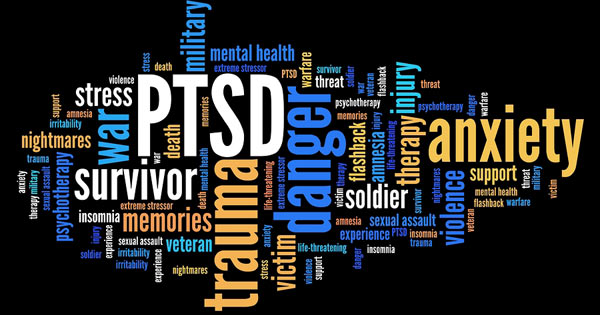Post Traumatic Stress Disorder and Hypnosis as a Treatment
by Erika Slater
In this article you’ll discover:
- How Post Traumatic Stress Disorder is triggered and manifests itself in disrupting sufferer’s daily lives.
- Current treatments including medications and therapies to help cope and overcome the trauma and triggering event.
- Further reading, studies and resource links around PTSD diagnosis and treatments.
Over the last 10-15 years, there’s been much discussion about Post Traumatic Stress Disorder (PTSD), as it relates to the general population. In previous generations it was common to hear PTSD discussed whenever one was referencing wars, namely ‘The Vietnam War’, and eventually later on ‘The Persian Gulf War’. Soldiers who had served in either war, often times came back ‘shell shocked’ from what they had witnessed or experienced as a by-product of the atrocities and violence of war. In fact, during the World Wars in the twentieth century soldier victims of the illness were diagnosed with the term “shell shock.”
Many soldiers were unable to resume ‘normal’ lives, as their everyday living was interrupted by intrusive thoughts caused by the memories of being in a vicious war. Even though it was considered a ‘mental illness’, it wasn’t considered serious enough to warrant the attention it deserved. Many individuals went unchecked or untreated, a sad state of affairs as it destroyed many lives.
Perhaps PTSD wasn’t taken serious enough because it was so misunderstood years ago. It was also a new phenomenon, and the criterion for diagnosing and assessing it weren’t cut and dry. The treatment protocols for how to go about helping individuals were still in early stages, so often times it was ‘hit or miss’, as there were too many misdiagnoses, or no diagnoses, and too many individuals suffering from PTSD slipped through the cracks and were never treated.
Incidentally, when more individuals who suffered from PTSD started to become a harm to themselves (usually suicides), or a harm to others – violence in their work places – it was then the mental health and medical communities realized it was a mental disorder warranting its own term and diagnosis.
When studies were eventually done to examine the effects of PTSD on suffering individuals, it was found there were correlations to anxiety disorders, depression, alcoholism and substance abuse problems. Upon digging further into the symptomologies of PTSD, it was discovered many who were diagnosed with alcoholism, drug addictions, anxiety disorders and/or depression had these ‘issues’ and disorders due the true underlying cause – Post Traumatic Stress Disorder.
Mental health practitioners (psychiatrists, psychologists, counselors and social workers) dug deep into the study of patients and individuals who suffered from PTSD, as well as the aforementioned other mental health disorders linked to it. They were interested to find out if the mental health issues were concurrent or co-existing, or whether one created the other (The ‘chicken or egg phenomena‘ – which came first?).
Furthermore, even though PTSD in most individuals was acutely similar, it was imperative to also recognize it in terms of differential diagnoses – not everyone was the same in terms of their personalities, or how they were coping with it.
This article will explore how PTSD awareness has evolved, how it’s currently assessed, diagnosed and treated. I’ll finally take a look at how hypnosis has been introduced as one of the treatments and some studies behind its use and effectiveness.
WHAT IS POST TRAUMATIC STRESS DISORDER?

Whenever someone is exposed to a situation that’s frightening, violent or catastrophic, repeatedly, or even just one time, and which is perceived as intense, this can create trauma in an individual.
For example, being exposed to accidents, crimes of violence, wars or even natural disasters, where one perceives it as a threat to life, can lead to trauma.
Individuals exposed to these situations are more inclined to feel helpless or powerless, leading to feeling intensely stressed out and traumatized because they cannot control the situation.
Furthermore, when these situations happen out of the blue, and are totally ‘unexpected’, it creates a greater sense of helplessness in the individual.
PTSD AND FLASHBACKS:
When an individual suffers from PTSD, they become ‘traumatized’. People use the term traumatized loosely often in everyday conversations, but those with PTSD are truly traumatized. Many suffer from recurrent negative thoughts, intensely vivid nightmares and flashbacks, which characterize the true essence of traumatization. People with PTSD will experience sudden intrusive negative thoughts that literally come out of nowhere and that overwhelm them where they feel out of control.
Many PTSD sufferers experience intense and recurring nightmares. Too often, their dreams and nightmares have themes or replays of what happened to them which traumatized them in the first place. They relive their accidents or traumatic events when they sleep.
Flashbacks are similar to nightmares; however, they occur during the individuals’ waking hours. They can be in the middle of something, when all of a sudden something triggers their thoughts and they literally feel like they’re thrown into the traumatic situation all over again. For example, some war veterans may be watching a movie that has violence or a war theme, and as they watch they suddenly go back into their mind (unconsciously) to their own experiences and believe what they are watching is real, and they act in real time accordingly as they would in the real situation!
WALKING ON EGG SHELLS:

Most PTSD suffers have an extremely difficult time focusing and concentrating on the rigors of their everyday lives. They are startled easily, and nervous to ‘certain triggers’ (people, places, things) which serve as reminders to their past traumatic events. No matter how safe they may be, they never feel safe. They’re always in a ‘fight or flight’ response mode waiting for something potentially bad to happen. This adds to stress as our body chemistry responses to danger is designed to last for just a few minutes to get us through the danger, and not for long periods of time.
Many PTSD suffers have a hard time processing their emotions. They become disconnected, even ignorant to positive thoughts, feelings and memories. Everything they think and feel has a ‘black cloud’ hovering over it, or so it would appear to them. Moreover, some individuals become so out of tune with their thoughts and feelings they literally feel disconnected from their bodies. They no longer enjoy their life, rather their life has gone from enduring life after the traumatic event to now ‘existing’.
When individuals get to this point in their lives, it’s not uncommon for them to develop behaviors that focus on avoidance. In the beginning, it’s not uncommon for them to avoid people, places and situations that remind them of the traumatic event they’ve experienced.
As time goes on, the ‘avoidance’ becomes transferred toward many other people, places and situations in their lives, even the ones that used to provide them with the greatest experiences of happiness and peace. Individuals who used to ‘love driving’ may avoid wanting to get behind the wheel of a car all together because the accident they were in has left them traumatized. Sadly, for many with PTSD their symptoms go untreated.
So, now we can understand where the person with PTSD has got to this state and symptoms they’re experiencing. Getting diagnosed and into treatment is the next step on road to recovery.
WHAT ARE THE TREATMENTS FOR PTSD?

More individuals will turn to alcohol! Let’s face it, it’s readily accessible and can be used at any time. For some, they use it to numb and dull their senses, or get them to the pass out state for sleep. Conversely, some individuals will use it as their ‘courage in a bottle’ to help them get through their days (work and social lives).
In the end, the longer one uses and abuses either of these methods, the more likely they are prone to develop addictions and depression.
Those who opt to see their physician or a psychiatrist will be offered anti-anxiety medications [2] to try and help them keep their thoughts and emotions in check. For some, the drugs will help them with functioning in their everyday lives. The idea with the drugs is to ‘help them cope’, until they overcome the traumatic thoughts and feelings. Unfortunately, for many, the drugs only numb or mask, but do not take the memories away.
Some individuals will be prescribed anti-depressants [2]. The trauma they experienced may have led them to become withdrawn or introverted from society and living, which has led to intense feelings of depression. The medications may work to help alleviate the depressive feelings, but in most situations will not remove the traumatic memories.
“The main treatments for people with PTSD are psychotherapy, medication, or a combination of the two. Everyone is different, so a treatment that works for one person may not work for another. Some people may need to try different treatments to find what works best for their symptoms” [3].
Cognitive Behavioral Therapy (CBT) [4] is often the first therapy choice for treating PTSD [3].
CBT helps individuals process current thoughts and feelings differently. CBT helps people becoming more focused on their moment to moment awareness and ‘think intentionally’! CBT teaches individuals to use methods and skills to bring them back to the present moment instead of living in the past – reliving the traumatic events.
CBT also encourages individuals to discuss the experience that traumatized them to ‘get it out’ and help them realize it’s a ‘past event’ that has nothing to do with what is happening in the present. These ‘talk sessions’ can greatly assist in helping people who have developed avoidance issues. The hallmark of CBT is empowerment. CBT teaches clients and empowers them to tale back total control of their lives through controlling their thoughts that leads to their emotions.
There have been recent studies on hypnosis as an alternative or adjunct therapy to CBT and I’ll explore this for you in the next section.
PTSD AND HYPNOSIS:

By way of an introduction hypnosis can help individuals who suffer from PTSD in one of two ways.
First, it can serve as a great tool for helping folks to relax and de-stress whenever they start to feel nervous, or have flashbacks. Second, it can help individuals block out the negative intrusive memories embedded in their unconscious minds.
Hypnosis can help individuals learn to relax. Through a series of relaxation techniques and suggestions, the mind will become retrained to scrutinize stressful situations and events differently. Stress and anxiety hypnosis teach the individual to respond differently. And how does one break free of their negative response ruts? By helping one to re-train their perception of what they are experiencing.
Hypnosis can help people to feel better about themselves, especially when intrusive PTSD flashbacks occur. It works with the unconscious mind that continually creates and recreates the stressful perceptions leading to flashbacks and nightmares.
By tapping into the source, hypnosis helps modify and re-train the problems, negative perceptions and memories in the unconscious mind. The source (the unconscious mind) begins to learn how to perceive similar situations differently, or in less stressing ways. Hypnosis also helps the person block out irrelevant perceptions and events which led to the initial trauma, which later led to the nervousness, nightmares and flashbacks.
Let’s look at a few studies involving effectiveness of hypnosis as a therapy treatment for PTSD.
The first cited study involves 32 chronic combat-related PTSD patients suffering with insomnia – a common symptom for PTSD suffers. The group was split into two with one receiving medication and the other hypnotherapy. The study author concluded “Hypnotherapeutic treatment revealed a significant primary effect on post-traumatic stress symptoms as measured by the post-traumatic stress disorder scale. This effect was always present at the follow-up one month later. Other benefits seen in the hypnotherapy group included decreased intrusion and avoidance responses and improvement in all of the sleep variables assessed” [5].
The next is a case study involving a woman who suffered trauma when large glass doors collapsed at her place of work and engulfed her on two separate occasions over a year. Name used was Julie and she was treated by a psychologist using hypnosis who documented each of the seven (7) sessions. The therapist tackled Julie’s anxiety and low self-esteem and feeling at fault for the accidents. Breathing and relaxation techniques were taught along with other coping strategies. The author wrote: “The use of a combination of hypnosis, cognitive behaviour strategies, exposure techniques, and relaxation hypnosis in the treatment of PTSD has been well documented, and appeared to work well in the case of Julie, reinforcing and enhancing an overall treatment approach. Additionally, Julie felt that she was much better equipped to deal with any distressing events in the future” [6].
Finally, Spiegel, Cardena noted in their paper ‘New uses of hypnosis in the treatment of posttraumatic stress disorder’ [7], “Hypnosis can be used to help patients face and bear a traumatic experience by embedding it in a new context, acknowledging helplessness during the event, and yet linking that experience with remoralizing memories such as efforts at self-protection, shared affection with friends who were killed, or the ability to control the environment at other times.”
Sufferers of PTSD wishing to explore hypnotherapy as a treatment should discuss with their physician options and referral to a hypnotherapist who has experience in helping others with trauma. Some psychologists are trained in hypnosis but professional hypnotherapists who specialize in trauma patients should also be pursued and interviewed.
CONCLUSION:
Post Traumatic Stress Disorder has come to prominence as a diagnosis in recent years due to the number of veterans deployed to war-torn zones returning and struggling to fit back into normal society and ravaged by their exposure to the horrors and demands of combat. But PTSD can be an outcome induced by any type of trauma and involvement in accident or witness to a triggering event.
Symptoms can include flashbacks and reliving of the event triggered during the day or as nightmares. Insomnia is a common side effect. Sufferers can live with anxiety and stress, depression, difficulty focusing, lack of motivation, and feeling of helplessness and social disconnection.
Treatments include medication and therapies, and/or both. Addressing the root cause usually requires therapies and Cognitive Behavioral Therapy (CBT) and counseling is in common use for PTSD sufferers. In recent years hypnotherapy has been introduced in conjunction with CBT and medication or as an alternative with success. Multiple sessions are usually required. Seek out a referral from your physician for an experienced counselor or hypnotherapist in trauma.
ADDITIONAL RESOURCES RELATED TO POST TRAUMATIC STRESS DISORDER:
[1] DSM-5 criteria for PTSD – Nature >>>
[2] Medications for PTSD – American Psychological Association (APA) >>>
[3] Psychotherapy Treatments for PTSD – Anxiety and Depression Association of America (ADAA) >>>
[4] Cognitive Behavioral Therapy (CBT) 101 >>>
[5] Hypnotherapy in the Treatment of Chronic Combat-Related PTSD Patients Suffering From Insomnia >>>
[6] The Use of Hypnosis in the Treatment of PTSD – Case Study – Carter >>>
[7] New uses of hypnosis in the treatment of posttraumatic stress disorder – Spiegel, Cardena >>>
Library of Self-Hypnosis Downloads Products >>>
Erika Slater CH
Free At Last Hypnosis
Massachusetts
CATEGORIES
FEATURED POSTS
Interested in making a significant change in your life and interested in learning more about what I do and how I do it? Discover my hypnotherapy services here or contact me here.

DISCOVER HOW TO START CHANGING HABITS TODAY.
In this free audio hypnosis session, you’ll experience the power of your subconscious mind to begin to change your habits. If you've never experienced hypnosis before then this is a great introduction...


